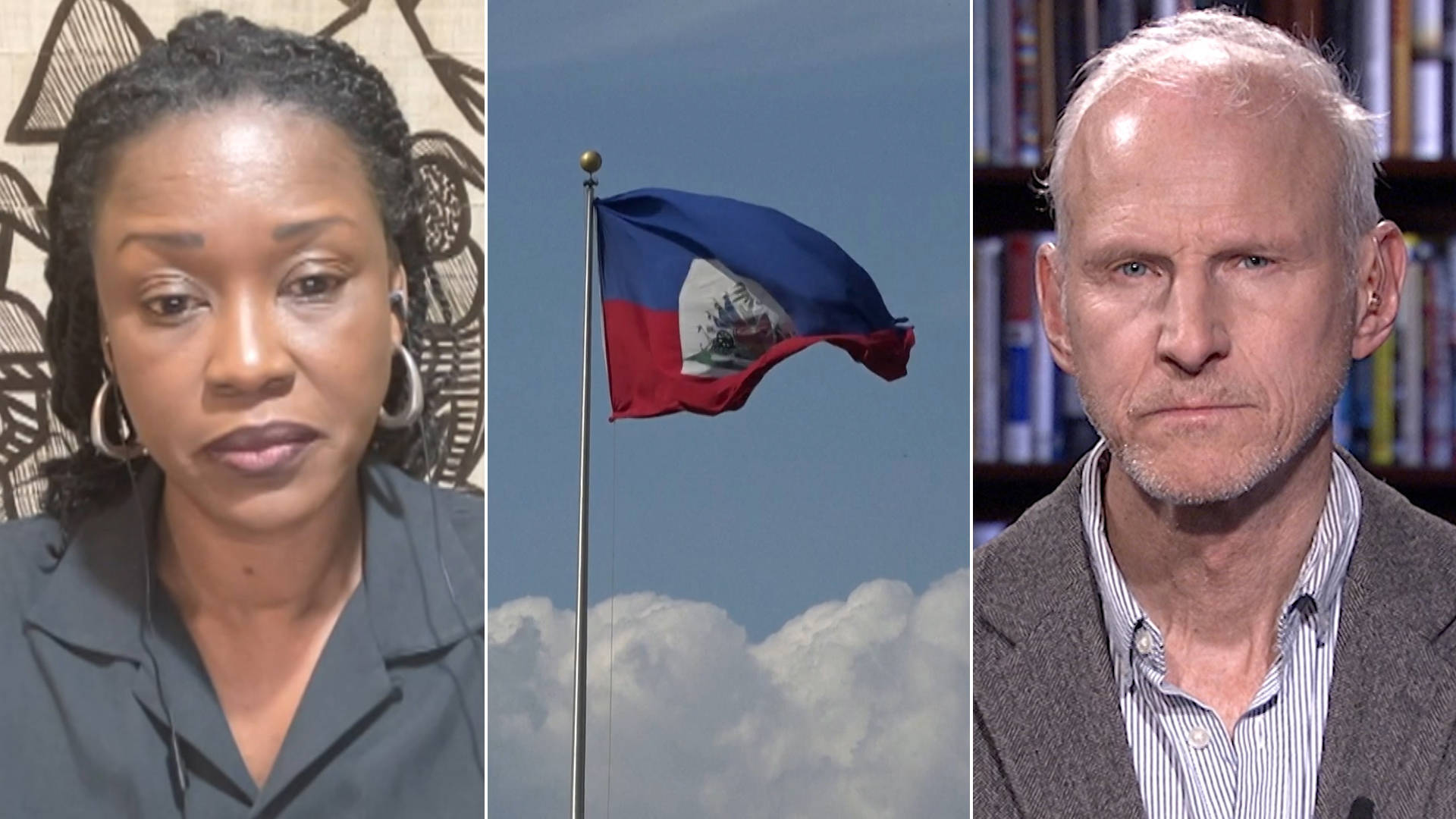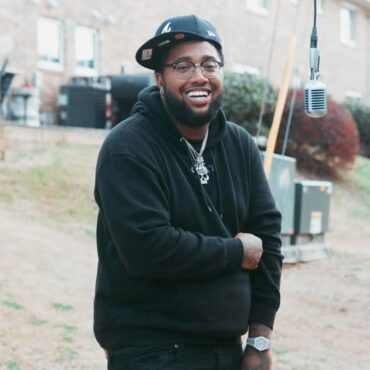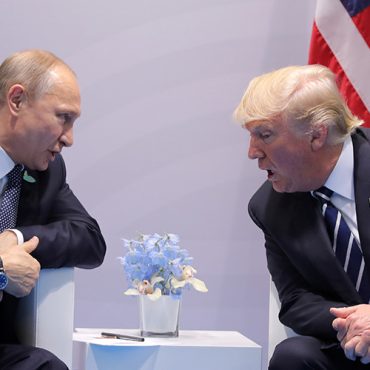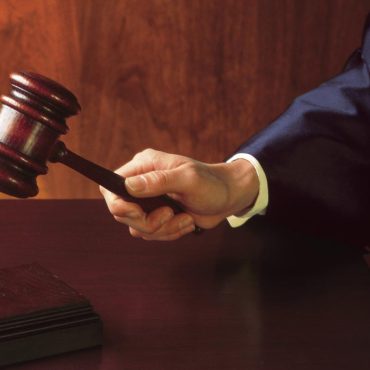This is a rush transcript. Copy may not be in its final form.
AMY GOODMAN: We begin today’s show in Haiti, where deadly violence continues between armed groups and police in Port-au-Prince. On Tuesday, U.N. rights chief Volker Türk deplored what he called the “unprecedented” scale of rights abuses in Haiti.
VOLKER TÜRK: [translated] There has been a shocking rise in killings and kidnappings. Sexual violence, particularly targeting women and young girls, is pervasive and very likely to have reached levels not seen before. As the number of people internally displaced rises — over 360,000 now, according to IOM — so, too, does a further risk of sexual violence, as people find themselves away from their homes and their communities. The scale of human rights abuses is unprecedented in modern Haitian history, inflicting a humanitarian catastrophe on an already exhausted people.
AMY GOODMAN: The spiraling political turmoil in Haiti appears to have no end in sight. Recently resigned Prime Minister Ariel Henry, who remains locked out of Haiti by armed groups, raised questions this week over the constitutionality of a transitional council, which is being formed to serve as an interim governing body until elections are scheduled. This comes as Canadian forces have been sent to Jamaica to train troops from Jamaica, Belize and the Bahamas to join the U.N.-authorized mission to Haiti led by Kenya. Last week, the U.N. human rights chief called for an arms embargo on Haiti, calling the situation there cataclysmic. The majority of guns pouring into Haiti are smuggled in from Florida and other parts of the United States.
For more, we’re joined by two guests. Here in New York, Kim Ives is with us, the editor of the English-language section of the weekly Haiti Liberté, where he’s also co-directed the documentary series Another Vision. And in Vancouver, Canada, Jemima Pierre is a Haitian American scholar, professor at the Social Justice Institute at the University of British Columbia in Canada and research associate at the University of Johannesburg.
We welcome you both back to Democracy Now! Professor Pierre, let’s begin with you. Can you just lay out, overall, the situation at this point in Haiti, with a resigned president not able to come back into Haiti — he’s condemning a transitional panel to rule Haiti — and this Caribbean group, led by Kenya, training to move in so-called U.N. peacekeepers?
JEMIMA PIERRE: Good morning, Amy. Thanks for having me back.
What’s going on in Haiti are a number of armed groups, at first, coming together to say that they were working together as an informal coalition, but the violence has been primarily in the Port-au-Prince area. And I have to stress that, because the West, to me, is presenting this as a countrywide civil war and so on, but there are some violence outside of Port-au-Prince, but the majority of the violence, the gun shooting, is actually in the Port-au-Prince area, primarily in the popular neighborhoods and around there, and especially now where you have some of these groups trying to take over parts — you know, trying to have battles with the police. So, that’s the first.
The second thing that we have to talk about, then, is this supposed presidential council that the U.S. is putting together, using CARICOM as the front-facing party — CARICOM is the Caribbean Communities — using CARICOM as the front-facing party to basically say that they have a supposedly Haitian-led solution for a transition in Haiti. The problem with that so-called Haitian-led solution is that it’s the U.S., France and Canada, which, as we’ve known before, are the major forces that have destabilized Haiti, at least in the past 20 years. They’re the ones leading the discussion — U.S., France, Canada, Brazil — leading the discussion along with the Caribbean Community. But as we said before, there needs to be — for the Haitian participation, they have to agree for a multinational security force to come in. Basically, in order to participate in this conversation, you have to be OK with a foreign invasion, which itself is a problem and basically tells us that the U.S. is controlling the situation.
Now, this foreign military force, people will have to remember that it is not a U.N. force. It’s U.N.-sanctioned, which is surprising, right? But it is a force that is coming in with absolutely — it’s not even clear what its mandate is. There’s a 33-page document that talks about the security force, but we don’t know what the rules of engagement will be, how will we prosecute the — you know, the inevitable war crimes that I think will happen when you have foreigners coming in and shooting at a population. But the other thing is, Canada is training Jamaicans, Bahamians to come in for — as if they’re coming into a war zone. And that itself bodes badly for us in — for people in Haiti.
And so, I think this is a terrible situation in the sense that what’s happening in Port-au-Prince is a result of guns being brought into the country from the U.S., Dominican Republic and Jamaica. But the other thing is that whatever solution that the U.S. is having is a completely inadequate and unconstitutional and illegal solution. And even the military force that the U.S. is trying to bring in, we have to remember they tried to get Brazil to lead it, Canada to lead it. They all said no. That force itself is not constitutional, because it was asked by an illegitimate government, Ariel Henry, from 2022. So, it’s a terrible situation, but I think that the idea that this is a Haitian — there’s a Haitian-led solution coming is actually a false one and one that is misleading.
JUAN GONZÁLEZ: And, Professor Pierre, I wanted to ask you about this transitional council. It’s supposedly been meeting now for several weeks, and nothing seems to have come out of it. How is even the decision-making of this council — is that transparent? Is it by vote? By consensus? Could you talk a little bit more about the council?
JEMIMA PIERRE: Well, we don’t know much about the council, and it’s not transparent. These are supposedly negotiations happening between CARICOM and especially the Guyanese president, who — and, you know, who has been very belligerent about these members of this community, the Haitians that they’ve chosen to participate in this discussion, that they have to agree to this multinational mission. Apparently, they came up with this — you know, members of the council have been chosen. Some people dropped out. In terms of leadership, the council is made up of, supposedly, people chosen by the U.S., members of the political class, the old political class that people really don’t want to have anything to do with, but key members of that. And there’s infighting amongst them. But recently, just, I think, a few days ago, the president of Guyana sent a letter to Ariel Henry to get his permission to ratify this transitional council, which itself should tell us everything we need to know, the fact that this ousted, illegal, illegitimate prime minister has to have a say in this traditional council.
So, I’m not sure — you know, at first, they were saying that they were giving them 48 hours to come up with a council to allow this transition. And the U.S. thinks it needs this council in order to make it seem like a military force coming into Haiti is legitimate. But I’m not sure how far we’re going to get with that, because, you know, I think, for Haitian people, this is a completely obscure process that leaves regular people out of the discussion.
JUAN GONZÁLEZ: Yeah, I’d like to bring in Kim Ives of Haiti Liberté. Kim, you recently helped an American YouTube personality there, Addison Pierre Maalouf, who was kidnapped, obtain his release. Could you talk about what happened there and your sense of what’s going on in Haiti?
KIM IVES: Yes, Juan. This was a YouTuber who went down and thought he was just going to drive from Cap-Haïtien, where he’d flown into, down to Port-au-Prince and interview Jimmy Chérizier, known as Barbecue. And he was kidnapped along the way. He spent 17 days in jail. He paid some ransom, or his family paid some ransom, friends. And once they paid, they weren’t released. The kidnappers wanted more. And that’s when they published the thing last Friday.
Dan Cohen, the co-director of Another Vision, and myself saw this come up on the radar, and immediately called Chérizier and said, “What’s going on? I thought you guys were stopping — you were going to shut down the kidnappers.” And he said, “Let me get on it.” And a few days later, he managed to convince or pressure Lanmò San Jou, the kidnapper, to release YourFellowArab, as this YouTuber is called. And so, yeah, it was, I could say, a victory for the Viv Ansanm coalition that Chérizier has put together, which is basically his anti-crime groups versus the former criminal groups, which are supposed to be dropping it, but, as we can see, they’re still doing some kidnapping.
AMY GOODMAN: Can you talk more about — go ahead, Juan.
JUAN GONZÁLEZ: No, no. I was just going to ask Kim about this issue of the — what we hear in the media is that these are all criminal gangs that are operating. But you have a different perspective on that, and I’m wondering if you could elaborate on the distinctions that you’ve tried to make with some of these gang groups or these paramilitary groups, really?
KIM IVES: Sure, completely. This is a revolutionary process we’re watching unfold in Haiti. These are basically armed neighborhood committees. Some of them have gone down a criminal road. Others are fighting against the criminals. And as a result, the U.S. is afraid of this, because the anti-criminal groups, led by Chérizier, have a revolutionary agenda. They want to change the system in Haiti. They want to overthrow it. And the U.S. flagged him as a danger early on. We have been looking into him carefully over the past four years and seen that he’s the genuine article, as far as we can see.
And they are trying to always demonize the Haitian people. They did this a century ago, in 1915, when Charlemagne Péralte organized what were at that time also considered bandits, the Cacos, who had been sort of rural ruffians who would ride into Port-au-Prince and overthrow a government and that sort of thing. But he forged them into a guerrilla force which fought the U.S. Marine occupation of 1915, that landed, was in the country ’til 1934. And they were all called bandits. So, they always have to demonize, criminalize the people’s resistance, and that’s what we’re seeing today when they try to put all the armed groups of Haiti’s popular classes into one bag called “the gangs.”
AMY GOODMAN: Kim, I wanted to go to a documentary series you did in 2022 called Another Vision, that tells the story of Barbecue, of Jimmy Chérizier, and the Revolutionary Forces of the G9 Family and Allies. Let’s go to a clip.
JIMMY CHÉRIZIER: [translated] You’re sick, Dad? What do you have? You have pain? A pain in your leg?
INJURED MAN: [translated] I can’t even stand up.
JIMMY CHÉRIZIER: [translated] You can’t stand up?
INJURED MAN: [translated] No.
JIMMY CHÉRIZIER: [translated] Did you go to the hospital?
INJURED MAN: [translated] No.
JIMMY CHÉRIZIER: [translated] Why didn’t you go to the hospital?
INJURED MAN: [translated] I have no money. I have nothing.
JIMMY CHÉRIZIER: [translated] You have no money to go to the hospital?
INJURED MAN: [translated] No.
JIMMY CHÉRIZIER: [translated] OK. I’m going to finish this video to show the entire world the conditions you are living in. This is a person, a Haitian, born and raised, nappy hair, a child of Dessalines, same as me, where a group of men have taken the country hostage and joined with a bunch of politicians, and they’ve reduced the people to the misery they’re living in today.
AMY GOODMAN: So, that’s Barbecue, Jimmy Chérizier, talking to a man in a flooded-out area, a very poor neighborhood. Talk about why he got the name Barbecue and what you see happening right now. As Professor Pierre was saying, why is Ariel Henry even weighing in now? Hadn’t he resigned? And it was Chérizier who demanded, along with the other armed groups, that he not come back and that he did resign.
KIM IVES: Yeah, well, Chérizier is the one responsible for keeping Ariel out, after finally getting Ariel out of power, as almost all of Haiti had been demanding over the past three years.
Essentially, just to go to your first question, he got the name Barbecue because in his neighborhood growing up there were three Jimmys, and they gave each one the nickname of what their parent did, and his mom sold barbecued meat, so he became Jimmy Barbecue. But this has been spun by the disinformation agents to be that he burns people alive and this sort of thing. They’ve been trying to demonize him all along.
But this uprising is basically threatening this political class. The U.S. has been — was using Ariel Henry, and they were holding onto him too long. It’s hard to shift horses when you’re galloping down the road towards disaster, and so they were loath to leave Ariel until they absolutely had to. And finally that came on February 29th, when Chérizier more or less put together all the armed groups of Port-au-Prince, even the criminal groups that he’s been fighting for four years, and basically said, “You cannot land at the airports.” And the people in Au Cap, which was the only other airport where Ariel could have landed, also organized to block his plane landing there. So, he was out. The U.S. had to shift. But they created this seven-headed monster, which everybody is shocked at. And all its members have discredited themselves, completely disgraced themselves —
AMY GOODMAN: You mean this transitional council.
KIM IVES: This transitional council — because they had to agree to a foreign military intervention. Now, Haiti just finished with a foreign military intervention only five years ago, in 2019, was the end of the MINUJUSTH, which followed on the MINUSTAH, 13 years of MINUSTAH. So, you had 15 —_
AMY GOODMAN: U.N. peacekeeping forces.
KIM IVES: Right. The first, after Aristide was overthrown by the U.S., the U.S. installed the MINUSTAH, which was, again, a cheaper-priced military force to occupy Haiti for 13 years, from 2004 to 2017. And then, from 2017 to ’19, they had a sort of wind-down force called the MINUJUSTH. So, 2019 is when MINUJUSTH left. And here we are, four years later, back in the same problem.
This is not a problem that can be solved with military force. This is a socioeconomic problem, as Chérizier is always saying. People need to eat. They need schools, hospitals, roads, sanitation, electricity, internet. They need the basics of life. And this is what he has been fighting for. And this is, you know, the essence of any of these revolutions which we’ve seen throughout history. I mean, the Bolsheviks had their revolution on the basis of land, peace and bread. So, the people are demanding change.
And right now this political class, which — basically, the oligarchy was using the criminal gangs to attack Chérizier. They’ve been fighting for the past four years. Now Chérizier has taken them, or tried to take them, into some kind of alliance. We’ll see how long it lasts. It’s a little bit, you have to think, like Mao Zedong with Chiang Kai-shek in the early ’40s to drive out the Japanese from China. He had to ally with some of his bitterest enemies, but they succeeded. So, we’ll see how far the Viv Ansanm coalition gets. It’s going to be a messy process, as revolutions always are.
JUAN GONZÁLEZ: Professor Pierre, I’d like to get your take on the situation and also Kim Ives’ analysis that some of these groups have revolutionary potential or are attempting a revolution.
JEMIMA PIERRE: Well, the truth is — well, not the truth, but part of my — the reality is, a lot of people haven’t seen that. So, part of it is it is a controversial take from Kim, who I respect. I do think I’m actually a lot more agnostic about what’s going on in terms of these armed groups and what they will end up doing in the future. But at this point, a lot of people in the popular neighborhoods, and so on and so forth, see these armed groups as the groups that have really impacted their lives in the poor neighborhoods, and they see them as people who are getting arms and money from the oligarchs, from the political elite, and so they don’t necessarily make that distinction.
And so, you know, my point of view is that, you know, if this is a revolution, we’re waiting for it to actually come to fruition. But in the meantime, what’s happening are a lot of people that are being displaced and that are seeing that their biggest foe are these armed groups that a lot of them mixed together as one, because what they see — you know, what they feel are bullets, what they hear are bullets, and what they see is they’re living in a space where there’s a lot of violence and a lot of pain. And so, then, if there’s a revolution, there needs to be a particular kind of ideology that takes over the entire — the country. And that remains to be seen.
AMY GOODMAN: We’re going to have to leave it there, but, of course, we’ll continue to cover this issue. Jemima Pierre, Haitian American scholar, professor at the Social Justice Institute at the University of British Columbia in Canada, research associate also at the University of Johannesburg in South Africa, her recent article for NACLA is headlined “Haiti as Empire’s Laboratory.” And Kim Ives, editor of the English-language section of the weekly Haiti Liberté.
Next up, we go to Jan Egeland in Oslo, Norway, secretary general of the Norwegian Refugee Council, as Israel faces global condemnation over the killing of seven aid workers from the World Central Kitchen in Gaza. Some humanitarian groups are suspending operations in Gaza even as it descends into famine. Stay with us.











Post comments (0)